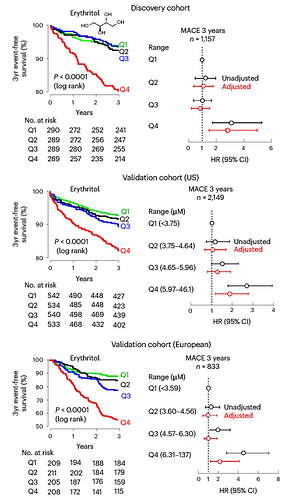As I think I’ve said here before that I pretty much detest what I call the “he-who” studies we see all the time. (He-who eats whatever gets bad thing). I also tend to take a quick look at the results and dismiss them because the effect is too small. If not, a look at how the test was done, food frequency recall tests get a lot of other studies thrown out.
This morning I saw this study in the news that got my attention. It associates consumption of erythritol with cardiovascular events. That link allowed me to read the study but not to save it as a pdf to read at my leisure. I haven’t read the whole thing word for word.
As far as this kind of study goes, it’s pretty well done. It’s only about 3,000 subjects, 2,149 US and 833 in EU, but instead of a result like a few percent or maybe 20% relative risk increase, it shows almost double the risk for Major Adverse Cardiovascular Events (MACE - I’ve never seen that term) such as heart attack (fatal or non-fatal) or stroke. It doesn’t say anything about recall surveys.
Maybe most importantly (as a study) there were experiments done on much smaller groups of people that seem to be controlled, if not actual RCTs (I can’t tell from my skimming).
They specifically say it’s association and can’t prove causation, and they try to show the make up of the groups: things like age, BMI, history of heart disease, diabetes and more.
I use erythritol, typically 3 teaspoons in a day. Seeing basically a 2x risk for these things makes me wonder if there’s a dose response, and there are tests done with “Platelet-Rich Plasma” that do show a dose dependent response; that is, the more erythritol consumed the stronger the response.
I’m not sure if I’m going to change my use of erythritol just based on this, but I thought I’d post it to see what others thought of this. I know some of you are really good at this sort of question.




